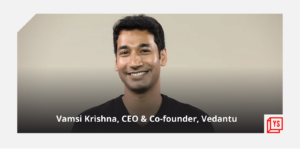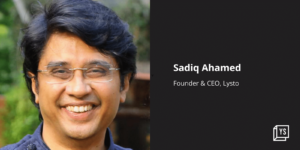“We create and publish content, but what is our actual product? It is not content, but the dignity of the user,” says Shashank Vaishnav, one of the Co-founders of the Noida-based content and entertainment B2C startup Stage.
“The other day, I was interviewing a guy at a cafe in Delhi when I asked him why he wanted to join Stage. The guy was from Haryana. He said if Stage becomes successful, he would be comfortable speaking in Haryanvi sitting in a cafe. In fact, some of the reviews of our app on PlayStore applaud us for ‘saving our cultural pride and dignity,” he continues.
Vinay Singhal, another Co-founder adds, “Just imagine some 20-25 years back how the English-Hindi divide would play out and how persons speaking in Hindi in an official context would experience shame. Now imagine that shame 10 times more for dialects which are not even officially recognised. If I betray a mother tongue influence (MTI) or Haryanvi accent, then people would automatically assume that I am illiterate, or not polished enough. Suppression of dialects becomes suppression of the people who speak them. When we create a premium app with high-quality content, which is specifically dedicated to Haryanvi, these people suddenly take pride in the fact that even Haryanvi can be premium.”
Vinay, Shashank and another co-founder Parveen Singhal are the founders of Stage, one of YourStory’s Tech50 2021 startups, which was founded in 2019. Together, they are driven by the core sentiment of giving back to the youth of Haryana their pride and dignity. And as Shashank puts it, “Stage helps them reinforce their identity.”
Stage is not a language-based content platform but a dialect-based one, and it is content done for Bharat with a bottom-up approach.
Building a dialect-based micro-universe
Vinay explains, “Our understanding is that we are so many countries within a country, we are so diverse, and there are so many nuances and cultural elements that don’t get captured in this manner. So, we wanted to build a hyperlocal content platform for Bharat.”
Vinay explains further how there is a general perception that everyone in the ‘Hindi belt’ speaks Hindi to the exclusion of regional dialects. “But even though I come from the hardcore Hindi belt, I prefer speaking Haryanvi. In fact, everybody speaks Haryanvi in Haryana but because we are so close to Hindi and we understand Hindi so well, everybody believes that we speak only in Hindi,” he adds. Bhojpuri, Bundeli, Awadhi and Braj are four main dialects spoken in Uttar Pradesh, whereas Bhojpuri, Maithili, Magadhi, Angika, Bhajika are the dialects spoken in Bihar. The overarching Hindi imposition does a disservice to this diversity, reminds Vinay.
“Today, we are solving it in one micro-universe, which is Haryana and Haryanvi. We are the Netflix for Haryanvi content right now. You will not find a single piece of content in Hindi on our platform even when all our users understand Hindi but that’s not our USP,” says Vinay about the USP of Stage.
Who would pay for Haryanvi content?
The biggest challenge that the founders faced was the problem of perception, with questions like “Who speaks in Haryanvi?” often posed to them. Some who found the idea unique warned them that nobody will pay for Haryanvi content.
“It was pushed so much into our brains that at one point of time we were even depressed. But then we launched monetisation six months ago, and got a fabulous response. We have 30,000 paying subscribers, and we are adding 7,000-8,000 subscribers every month. So, there are a lot of flawed perceptions and misinformation that keep floating about Bharat because not many people have actually done the ground research,” reminds Vinay.
Another big challenge was that there was no pre-existing dialect-driven entertainment industry. Since Haryanvi doesn’t have a film or an entertainment industry, the founders had to actually build an entire film industry from scratch. So, that took a little longer than what they had expected but the journey has been rewarding. When one creates the supply, one can also control the supply.
The category creator advantage
The unique advantage that Stage has about being a solo player in the dialect-based content game surely works for them, but being solo doesn’t mean the startup is immune to competition.
Vinay explains, “We are the only one in the dialect-based content space but we understand that entertainment or digital content consumption is at the end of the day a zero-sum game because the amount of time a user can spend online is limited at the end of the day.”
Invariably, Stage has to compete with the OTT majors that provide language-based and short-form content, which is where users supposedly spend most of their time. So, from a larger time-share point of view, Stage has to compete with all of these platforms and create a space for itself but what works in their favour, according to the startup, is their unique category creator advantage.
“We keep saying that we don’t want to replace Disney+Hotstar, MX Player, Netflix or Amazon Prime on your phone. We believe that we will co-exist along with them. If we would have been putting out Haryanvi stories in Hindi, then we would have been competing with them,” explains Vinay.
Parveen says that Stage has a Netflix model where a content project is completely outsourced to the creator’s production house, and at every stage of the production through the post-production process, right from scripting to screenplay, to casting, Stage has its quality check processes in place. This is done to assure that there is a certain standard of the content that is published on the platform.
Vinay adds that comedy as a genre works amazingly well at any point in time. “Comedy in the form of stand-ups, storytelling, sitcoms or web-series do well. So does drama of any kind, people just love it. People also love dubbing, for instance, Telugu movies dubbed in Haryanvi draw amazing traction on our platform,” says Vinay.
Expanding the micro-universe, one dialect at a time
Stage is currently focusing on enhancing its presence across Haryana and achieving one million subscribers by 2022 within one dialect.
The startup’s goal is to launch in at least 25 major dialects of the country as well as reach 20 million subscribers by the end of 2025.
Shashank emphasises that Haryana is the micro-universe of Stage and the founders wanted to attain product market fit (PMF) to begin with, and which they have been able to achieve now as users are paying.
The monthly retention is currently 85 percent. “So, for the next two-three months, we would continue to solve the Haryanvi problem in depth. After some time, we are going to go for Rajasthani and then we want to take this model to Bihar. The idea is that in the next three-four years, we will solve 25 main Indian dialects,” says Shashank.



![Read more about the article [Funding alert] MyGlamm names Shraddha Kapoor as brand ambassador and investing partner](https://blog.digitalsevaa.com/wp-content/uploads/2021/06/800x4004-1623930231677-300x150.png)



![Read more about the article [App Friday] AstroTalk hits the mark when it comes to functionality with something for everyone](https://blog.digitalsevaa.com/wp-content/uploads/2022/04/AppFridayAstroTalks-01-1649339327472-300x150.png)


![Read more about the article [Matrix Moments] When is the right time to announce a fundraise?](https://blog.digitalsevaa.com/wp-content/uploads/2021/08/Matrix-1576827792518-300x150.png)